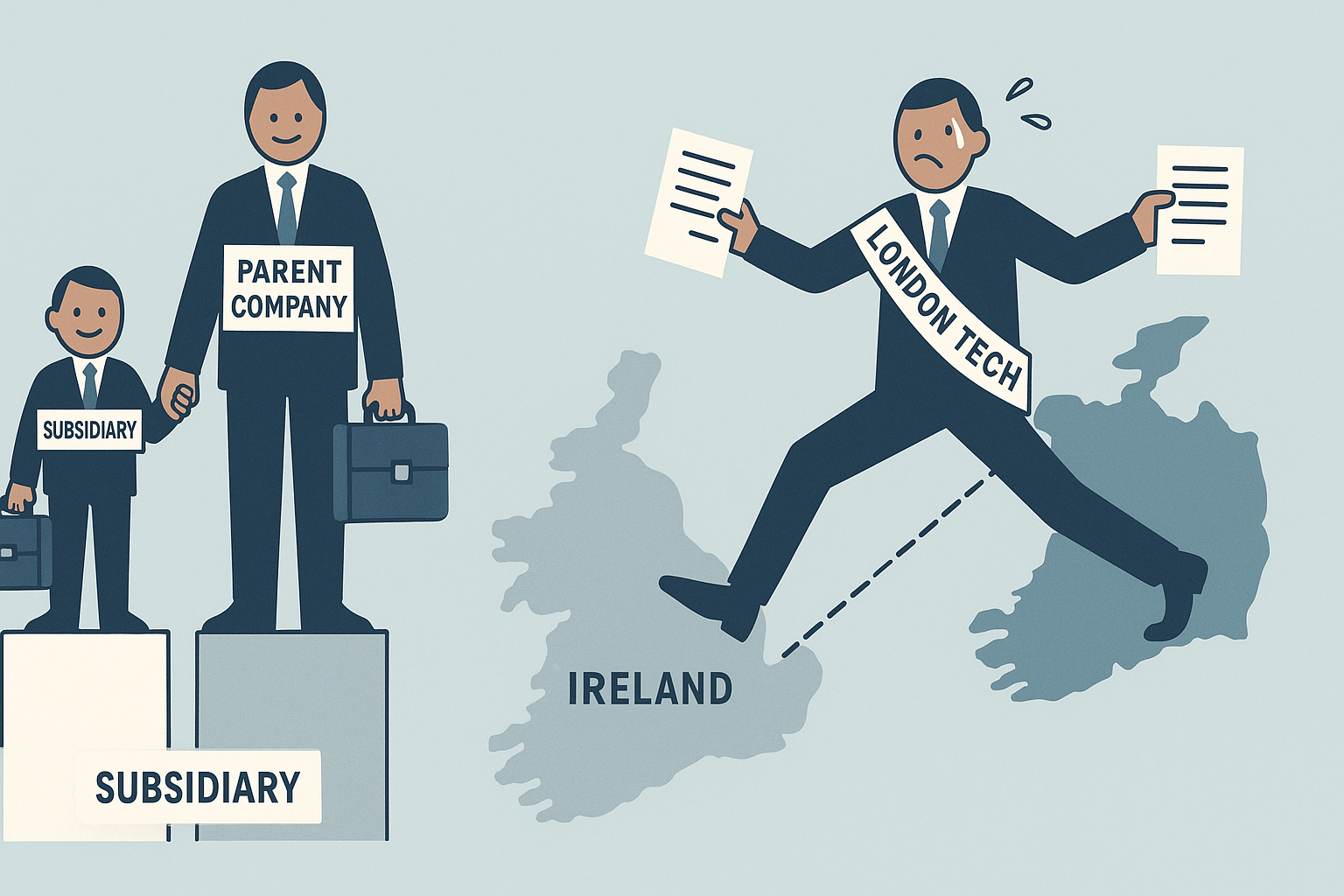Thinking about launching a FinTech company in Ireland? This comprehensive guide is written for entrepreneurs and innovators looking to enter Ireland's FinTech ecosystem.
If you're ready to take the next step and have at least one EEA resident director in your team, you can visit our guide on how to set up your Irish company here.
No EEA-resident team member? Visit our non-EEA resident section here.
Key Takeaways:
- Ireland's FinTech sector experienced remarkable 291% growth in 2024, with investment reaching $237.95 million across 25 deals
- The payments sector remains the strongest area globally, attracting $31 billion in investment in 2024
- Ireland hosts over 400 international financial firms and more than 200 Irish-born FinTech companies
- The corporate structure requires at least one EEA-resident director, but regulatory licensing adds another crucial compliance layer

Ireland's FinTech Advantage
Ireland's fintech industry is growing strongly, bringing in almost €1 billion in investment over the past five years.
In 2023, Irish fintech companies raised €266.3 million - the second-best year for deals in ten years. This happened even when fintech funding fell in other parts of Europe.
This growth stands in stark contrast to global trends. While global fintech investment fell from $119.8 billion across 5,382 deals in 2023 to $95.6 billion across 4,639 deals in 2024, Ireland bucked the trend spectacularly.
What makes Ireland particularly attractive is its unique position as the only English-speaking EU member state, combined with its competitive 12.5% corporate tax rate and access to EU markets.
Ireland hosts a number of FinTech hubs, including Aon's Centre for Innovation and Analytics, Citi's Innovation Lab, Bank of Ireland's Innovation Lab, and Mastercard's European Technology Hub.
The Irish FinTech Ecosystem
Ireland's FinTech landscape spans multiple sectors, with payments leading the charge.
The 2023 update published by the Central Bank's Innovation Hub notes that, by the end of 2023, it had held 389 engagements across a number of sectors, including payments, RegTech, Blockchain, Crypto and InsurTech.
Key areas of FinTech activity in Ireland include:
- Digital payments and e-money services
- RegTech solutions for compliance automation
- Blockchain and cryptocurrency services
- InsurTech innovations
- Wealth management technology
- Open banking solutions
Understanding the Dual-Layer Structure
When establishing a FinTech company in Ireland, it's important to understand that there are two "layers" of compliance that will apply to you: the corporate layer and the regulatory layer.

The Corporate Layer
This is the standard company compliance layer that applies to all businesses in Ireland.
Your FinTech company will typically be incorporated as a private company limited by shares, requiring:
- At least one director who is an EEA resident
- A company secretary (who cannot be the sole director)
- An Irish registered office address
- Compliance with Companies Registration Office (CRO) requirements
- Annual returns and financial statement filings
This corporate foundation can be identical, whether you're running a consulting firm, tech startup, coffee shop or FinTech operation.
The Regulatory Layer
The regulatory layer sits on top of your corporate structure and governs the specific financial services you provide. This is where FinTech companies face additional requirements that don't apply to regular businesses.
Depending on your FinTech activities, you may need specific licences or authorisations from the Central Bank of Ireland:
- Payment Services: If you're processing payments, you'll need either a Payment Institution licence or an Electronic Money Institution licence.
- Crypto Services: Entities providing certain crypto-asset services within the EU are required to be authorised as CASPs under the Markets in Crypto-Assets Regulation (MiCAR).
- Investment Services: Companies providing investment advice or portfolio management need authorisation as an Investment Firm.
- Insurance Technology: InsurTech companies may require insurance intermediary or insurance undertaking licences.
- Credit Services: Lending platforms typically need Consumer Credit Act authorisation or Alternative Investment Fund Manager licences.
The key distinction is that while your corporate obligations are standardised and will definitely apply to you, your regulatory requirements are entirely dependent on the specific financial services you offer.
This dual structure means that FinTech companies face both the standard corporate governance requirements that apply to all Irish companies, plus additional regulatory compliance obligations specific to financial services - and you will likely need to get approved to do those services first - probably by the Central Bank of Ireland.
The regulatory layer often involves more complex ongoing obligations, including prudential requirements, conduct of business rules, and regular supervisory reporting - and generally will require one of the larger law firms (or a small boutique one) to assist.
Open Forest can do all of the corporate layer for you and can give you advice on where to start with your regulatory layer.
Building Your FinTech Structure
When incorporating your FinTech company in Ireland, consider creating a flexible share structure from the outset. Unlike traditional service companies, FinTech startups often need to accommodate multiple funding rounds, employee share schemes, and potential strategic partnerships.
Key considerations include:
- Authorised share capital with room for growth
- Multiple share classes for different investor types
- Employee share option schemes
- Regulatory capital requirements specific to your licence type
The intersection of corporate and regulatory requirements means that your company structure should anticipate both commercial growth and compliance obligations.
How Can Open Forest Help?
Open Forest offers comprehensive incorporation packages specifically designed for FinTech companies, starting from €99 including CRO fees.
Our FinTech-specific packages include guidance on share structures suitable for funding rounds, regulatory compliance frameworks, and ongoing support to help you meet both corporate and financial services obligations.
Choose from one of our incorporation packages here and we'll take care of the rest.

Stuart Connolly is a corporate barrister in Ireland and the UK since 2012.
He spent over a decade at Ireland's top law firms including Arthur Cox & William Fry.





.webp)
.webp)
.webp)





